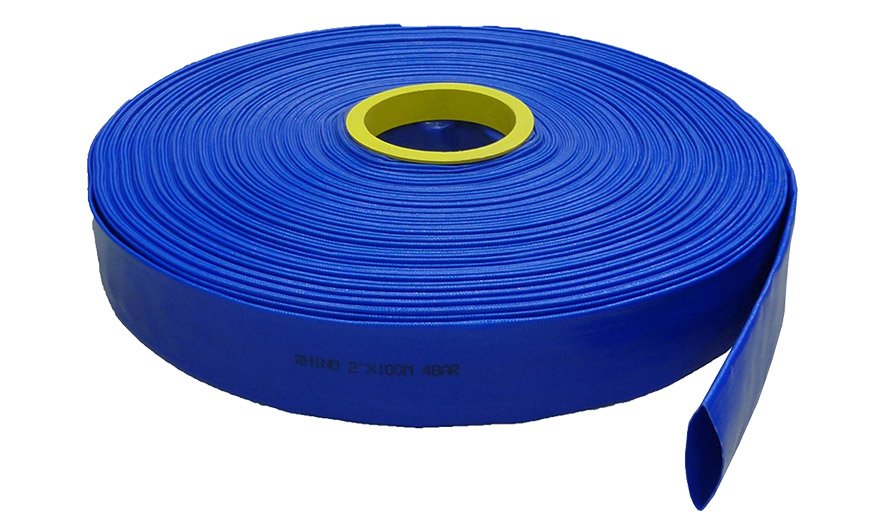A layflat hose is a reinforced PVC hose which can collapse upon itself for storage purposes. These types of hoses are primarily used for irrigation and water supply. However, they are also popular among industries such as mining, construction, and firefighting. This is due to their flexible, hardwearing and lightweight properties.
Layflat hoses are often constructed with thermoplastic polyurethane (TPU) with a combination of nitrile rubber. Since these hoses are developed keeping in mind enhanced inner reinforcement, extrusion in them is created with the help of a unique method called weave method. Further, by making use of a rubber cover, the hose is bonded much strongly to ensure reinforcement.
Lay-Flat hoses come in various diameters from 2” (50mm) and up to 8” (200mm), as well as various pressure ratings from PN2 to PN16.
There are two main types of a layflat hose: the heavy duty layflat hose and the medium duty layflat hose. As their names suggest, the heavy duty layflat hose is specially adapted to withstand the stresses of demanding use, while the medium duty layflat hose is the perfect tool for less challenging work.
A layflat hose can be put to a multitude of other uses. You will often see them attached to a fire engine. They are great for fighting fires, but can perform equally well in cleaning up a flood area when used alongside a water pump.
As the water pump sucks water up, the layflat hose is used to discharge the same water into a safe area away from the flood. If lever lock couplings are also used as a way of joining several hoses together, the distance from the flood area to the area of discharge can be increased. This use of a layflat hose is common in pit mines.
Similarly, they are often used in fracking when large quantities of water may need to be transported over rough and uneven ground. They offer much easier handling than a pipe system and are usually the go to choice for water contractors.
Another popular use for the layflat hose is as a garden tool as they can be easily manipulated to reach anywhere in the garden, and are light enough to be used on a daily basis.
READ: Vinyl Pipes sets eyes on expansion into Sub-Sahara Region
Another area where a layflat hose can be well utilised is that of flood clean up, when used in tandem with a water pump. The water pump sucks up water from the flooded area, and then a layflat hose is used to discharge this to a safe area or flood plain that is often several hundred metres away. Layflat hoses can be joined together quickly and easily with lever lock couplings – these allow you to create the perfect length of hose for the task you need it for.
There are some key features of layflat hose, these include:
Flexibility – the PVC that our layflat hoses are made from means they are extremely flexible and resistant to kinks this allows for easy compression when not in use. Therefore layflat hose is ideal for storage and transporting as well as being user friendly.
Resistance – the combination of woven yarn reinforcements and an inseparably fused inner and outer wall makes these hoses resistant to most oxidising and reducing agents as well as diluted acids and alkalis. The features also help to avoid the onset of rotting and helps avoid abrasion – this means the lifespan of a layflat hose is very long. We can also use layflat hose as an over sleeve for protection due to its makeup.
Lightweight – although layflat hoses are strong and durable, the way they are made means they are lightweight and as such easy to use and transport. Layflat hoses have a collapsible design which means that storing and getting them out is easy and simple. This means they are ideally suited to irrigation in industries such as farming or construction.
Although these are quality tested, you should take precautionary measure not to deliberately bring harm or damage to the hose. It is important to ensure heavy vehicles are not driven over the lay flat hoses. If you need to lay these hose across the road or your paths, you must make sure hose ramps are used.
As much as possible, lay these hoses straight. If you bend it around the corners, the pressure of the liquid or water may reduce and there may be a breakage of the layer over a period of time. If the hose is frozen do not attempt to roll it up. The sharp ice particles can cause damage to the hose. When hose is used for certain substances or systems such as foam, you should ensure you rinse off the hose thoroughly with clean water.
Finally it is also important to ensure you buy lay flat hoses from reputed and distinguished suppliers, wholesalers of lay flat hoses to guarantee quality.


I liked it when you shared that it is best to use lay flat hoses as they have a collapsible structure that can make storing and getting them out easy and simple. Besides, they are lightweight and easy to be transported. I would like to think if a company needs to get lay flat hoses, it should consider getting it from a reliable supplier.